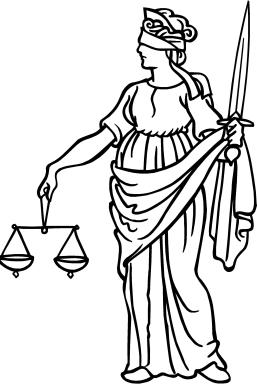The rule of law is quite important. Why? Because it is an important underpinning of personal liberty and economic prosperity.
Rule of law means that society is ruled by established principles of law rather than the arbitrary whims of a ruler. Rules are paramount, not rulers.
Rule of law is one aspect of the stable environment I mentioned in my liberty spectrum post. It allows people to understand up-front the boundaries of what is legal and what is not. It helps people feel comfortable about making investments, entering into contracts, providing credit, and so on. Stability also allows people to plan for the future. All of this is good for prosperity.
The recent nomination of Judge Gorsuch to the Supreme Court provides an opportunity to discuss this.
Inappropriate questionsDuring the review process some Senators asked inappropriate questions about Judge Gorsuch’s treatment of the ‘little guy.’ Here are three examples:
Senator Hirono (D-HI): “I have not seen that the rights of minorities are a priority for you … You rarely seem to find in favor of the little guy.”
Senator Feinstein (D-CA): “How do we have confidence in you that you won’t be just for the big corporations? That you will be for the little men?”
Senator Harris (D-CA): “Judge Gorsuch has consistently valued legalisms over real lives. I won’t support his nomination.”
The tone of these comments suggest that these Senators wanted Judge Gorsuch to say that he will rule in favor of workers and minorities and against big corporations.
Sympathy and empathyThis is not a new sentiment. Some people believe that judges should allow their sympathy and empathy to skew their rulings in favor of the little guy.
Such sentiment usually comes from supporters of Big Government. It is likely an extension of their desire for government to take care of the little guy. Their primary goal is to help the little guy, and whether that is achieved via legislation or a judge legislating from the bench is of lesser concern.
Now, wanting to help the little guy is noble and admirable. But there is more to life than good intentions, and trying to help the little guy via a skewed judiciary is the wrong way to go about it.
Why? It violates the rule of law.
Blind justice Justice is supposed to be blind, meaning the law provides equal justice to all people regardless of race or gender or socioeconomic status. This is why Lady Justice is often depicted as blindfolded.
Justice is supposed to be blind, meaning the law provides equal justice to all people regardless of race or gender or socioeconomic status. This is why Lady Justice is often depicted as blindfolded.
This is not mere symbolism. Blind justice means all citizens have equal rights under the law whether powerful or weak, rich or poor, famous or nobody special, top government official or ordinary citizen.
This is a significant equalizing force in society. It protects the little guy. The big guy cannot run roughshod over the little guy because he is protected by the rule of law. Everyone has to follow the rules.
BUT… this does not mean that justice should automatically favor the little guy. It means the little guy deserves a fair shake, like everyone else. Justice should be blind.
The proper role of judgesThe proper role of a judge is to interpret laws and ensure that justice is blind. Judges should decide each case on its legal merits, adhering to the Constitution and existing laws. Rulings should be based on what the law actually says and not skewed toward what a judge thinks the law should say. This respects the rule of law.
A judge who ignores the law to rule in favor of the little guy is essentially creating new law. This violates the proper role of a judge.
Negative consequencesJudges who rule based on their personal preferences can cause real harm to both the rule of law and overall prosperity.
Weakens separation of powersFirst, it weakens the separation of powers. A judge behaving that way assumes power to both adjudicate and legislate, essentially seizing power from Congress.
This is a threat to our individual freedoms. Remember, the purpose of separation of powers is to make it difficult for any one person, department, or branch of government to accumulate too much power and become capable of abusing our freedoms.
Harms other peopleSecond, although a ‘sympathetic’ ruling helps the little guy involved in that case, it can cause greater harm to many other people.
To illustrate, let’s look at a simplified example. Assume that we have a defendant accused of not paying back a loan as contractually obligated. Assume the legal facts clearly show that the loan is legal and the defendant’s failure to repay is illegal.
Now let’s throw in a ‘little guy’ complication. Assume that the plaintiff is a major financing company while the defendant is a poor Hispanic guy with few assets. Let’s call our case Big Finance Company (BFC) versus Jose.
If the judge rules that Jose does not have to repay his loan, this can harm other people as follows.
Harms finance companiesOf course, BFC is immediately harmed because they are not repaid. This may not bother you, but BFC is also entitled to equal protection under the law. They loaned the money in good faith expecting to be repaid.
The arbitrary ruling might persuade BFC to cut back on lending to all Hispanics. BFC may even decide to avoid expanding the business. In short, the ruling might harm BFC’s ability to increase sales and make a profit.
Other finance companies might be harmed in a similar way.
Harms other ‘little guys’But harming finance companies creates ripple effects. Cutbacks in lending to Hispanics will harm Hispanics who wish to borrow. Cutbacks in expansions might harm anyone who wishes to borrow.
The arbitrary ruling may also create moral hazard. A small percentage of Hispanics might conclude that they can get away with not paying their financial obligations.
None of this is good for rule of law and prosperity.
The right way to help the ‘little guy’Does this mean we should never help the little guy? Of course not! Just do it the right way. If there is a law that does not treat everyone equitably, get Congress to change the law. On a personal note, we are all free to help the little guy with charitable donations of our own time or money. If we really want to help the little guy, history shows that the best path is economic freedom and capitalism.
But don’t encourage skewed judges. That harms the rule of law that supports widespread prosperity, and might harm more little guys than it helps.
I encourage you to enter comments or questions below. Two rules: 1) be reasonably polite, 2) address the issue and avoid personal attacks.
Advertisements Share this:




